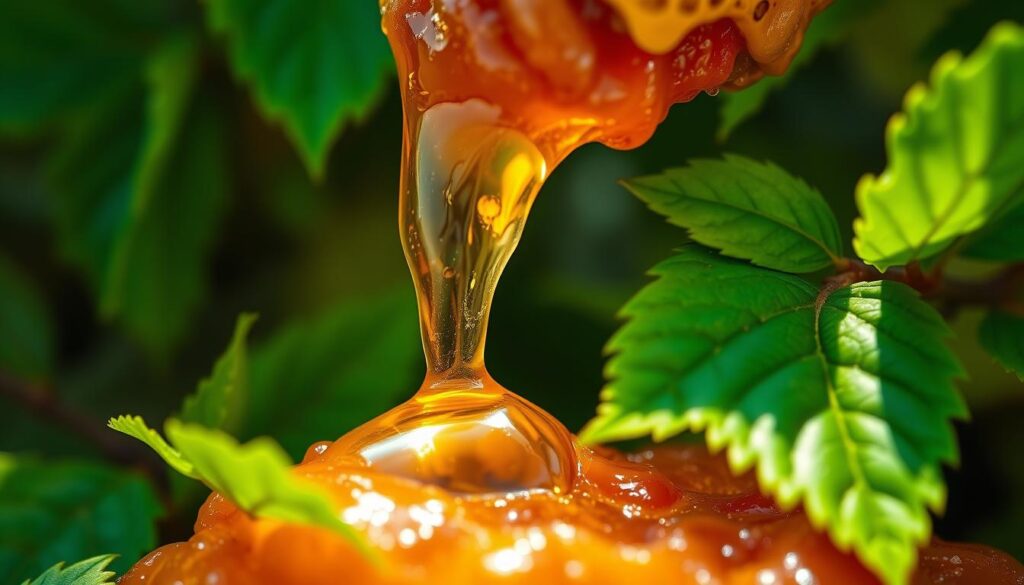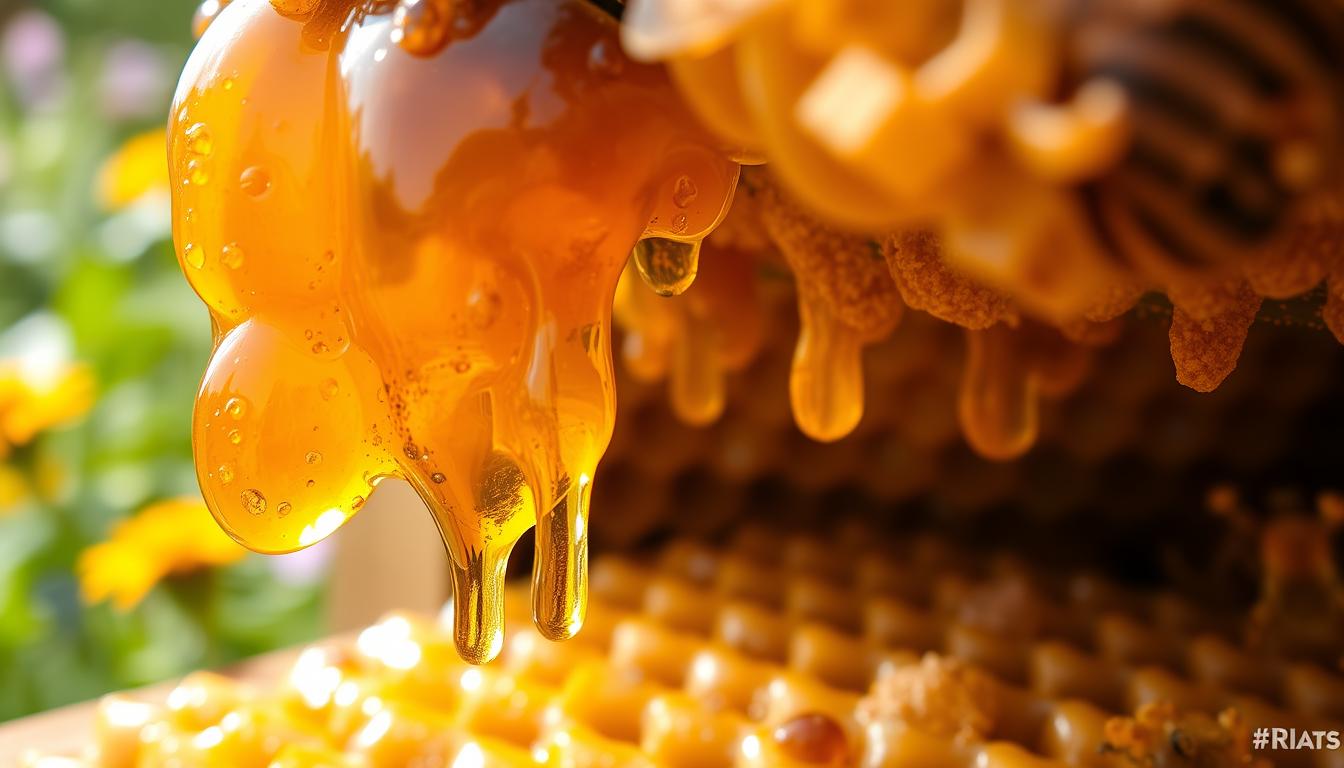Have you ever heard of propolis and its remarkable health benefits? This unique substance, produced by industrious bees, has been used for centuries in traditional and complementary therapies. But what makes propolis so special, and how can it support your overall well-being? Prepare to uncover the secrets of this remarkable bee-derived material and discover its diverse range of applications.
Key Takeaways
- Propolis is a natural substance produced by bees that offers a wealth of health benefits.
- It possesses powerful antibacterial, antioxidant, and anti-inflammatory properties that can support your immune system and overall wellness.
- Propolis is used in traditional and complementary therapies to promote wound healing, tissue repair, and skin regeneration.
- Discover the diverse applications of propolis and how it can be incorporated into your health and wellness routine.
- Learn about the safety considerations and potential side effects of using propolis supplements or products.
What is Propolis?
Propolis is a remarkable substance produced by industrious honey bees. This resinous material is a complex mixture of plant resins, beeswax, and other bee-derived components. Bees meticulously collect propolis from various plant sources, such as tree buds and leaves, and use it to seal and protect their hives.
The Remarkable Bee-Derived Substance
Propolis is a truly remarkable substance, with a unique chemical composition that varies depending on the geographical region and the specific plant sources available to the bees. This natural material has long been revered for its diverse range of propolis composition, propolis sources, and propolis production capabilities.
Composition and Sources
| Propolis Composition | Propolis Sources | Propolis Production |
|---|---|---|
| – Resins (50-70%) – Beeswax (20-35%) – Essential oils (5-10%) – Pollen (5%) – Other compounds (1-5%) |
– Tree buds and leaves – Flowers and plants – Bark and sap |
– Collected by worker bees – Processed and mixed with saliva – Used to seal and protect the hive |
The unique propolis composition and the diverse propolis sources contribute to the remarkable propolis production capabilities of honey bees, making this substance a true marvel of nature.
Propolis Uses and Health Benefits
Propolis, the sticky substance produced by bees, is a natural powerhouse with a wide range of uses and remarkable health benefits. This versatile substance has long been recognized for its ability to support the body’s well-being in various ways.
One of the primary propolis uses is its potential to bolster the immune system. Propolis is rich in antioxidants and antimicrobial compounds, making it a valuable ally in the fight against harmful microorganisms. Studies have suggested that propolis benefits may include enhancing the activity of immune cells and supporting the body’s natural defenses.
In addition to its immune-boosting properties, propolis health benefits extend to promoting wound healing and tissue repair. Propolis has been found to possess anti-inflammatory and regenerative properties, which can aid in the healing process and support skin health. Its ability to promote skin regeneration has made it a popular ingredient in various skincare and natural remedy formulations.
| Propolis Uses | Propolis Benefits |
|---|---|
| Immune system support | Antimicrobial and antibacterial properties |
| Wound healing and tissue repair | Anti-inflammatory and antioxidant effects |
| Skin health and regeneration | Promotion of skin healing and rejuvenation |
Beyond these well-known propolis uses and propolis benefits, this natural substance has also been explored for its potential applications in alternative medicine and complementary therapies. Its versatility and wide-ranging health benefits make propolis a valuable addition to the natural health and wellness arsenal.
“Propolis is a true gift from nature, with its remarkable properties and diverse applications in promoting overall well-being.”
Antibacterial and Antimicrobial Properties
Propolis, the natural resin produced by honeybees, is renowned for its potent propolis antibacterial and propolis antimicrobial properties. This versatile substance has been extensively studied for its remarkable ability to effectively inhibit the growth and activity of a wide range of harmful bacteria, fungi, and viruses.
Fighting Harmful Microorganisms
The antibacterial and antimicrobial capabilities of propolis are attributed to its unique chemical composition, which includes a complex blend of flavonoids, phenolic compounds, and other biologically active ingredients. These compounds work synergistically to disrupt the cellular structures and metabolic processes of various pathogenic microorganisms, making propolis a valuable natural agent in the fight against infectious diseases.
Studies have demonstrated the effectiveness of propolis in inhibiting the growth of Staphylococcus aureus, Escherichia coli, Pseudomonas aeruginosa, and other common bacterial pathogens. Additionally, propolis has been shown to possess antifungal properties against Candida species and various types of mold.
| Microbial Organism | Propolis Effectiveness |
|---|---|
| Staphylococcus aureus | Highly effective in inhibiting growth |
| Escherichia coli | Effective in inhibiting growth |
| Pseudomonas aeruginosa | Effective in inhibiting growth |
| Candida species | Potent antifungal properties |
The remarkable propolis antibacterial and propolis antimicrobial properties of this bee-derived substance make it a promising natural alternative for combating a variety of infectious agents, with potential applications in both traditional and complementary medicine.
Antioxidant and Anti-Inflammatory Effects
Propolis, the natural resinous substance produced by bees, is renowned for its impressive antioxidant and anti-inflammatory properties. This unique composition of bioactive compounds, including flavonoids and phenolic acids, empowers propolis to combat oxidative stress and inflammation, two key contributors to various health conditions.
The antioxidant capacity of propolis is attributed to its ability to neutralize harmful free radicals, which can otherwise damage cells and contribute to the development of chronic diseases. By scavenging these reactive molecules, propolis supports overall well-being and protects the body from the detrimental effects of oxidative stress.
In addition to its antioxidant prowess, propolis also demonstrates potent anti-inflammatory effects. The bioactive compounds in propolis have been shown to modulate the inflammatory response, reducing the production of pro-inflammatory mediators and inhibiting the activity of enzymes responsible for inflammation.
These multifaceted benefits make propolis a valuable natural resource in the management of conditions associated with oxidative stress and inflammation, such as cardiovascular diseases, arthritis, and certain types of cancer. By harnessing the power of propolis, individuals can take a proactive approach to their overall health and well-being.

“Propolis is a remarkable natural compound that offers a unique blend of antioxidant and anti-inflammatory properties, making it a valuable tool in supporting overall health and wellness.”
Wound Healing and Tissue Repair
Propolis, the remarkable bee-derived substance, has demonstrated remarkable capabilities when it comes to wound healing and tissue repair. Its unique composition, rich in antimicrobial, anti-inflammatory, and antioxidant compounds, makes it a valuable natural agent for promoting skin regeneration and accelerating the healing process.
Promoting Skin Regeneration
One of the key benefits of propolis is its ability to stimulate the growth of new skin cells, a crucial factor in the healing and regeneration of wounded or damaged tissue. Propolis wound healing properties are attributed to its high content of flavonoids, phenolic acids, and other bioactive compounds that work in synergy to support the body’s natural healing mechanisms.
Studies have shown that propolis can:
- Enhance the proliferation and migration of skin fibroblasts, the cells responsible for producing collagen and other structural components of the skin.
- Promote the formation of new blood vessels, increasing the supply of oxygen and nutrients to the wounded area.
- Reduce inflammation and oxidative stress, two key factors that can hinder the healing process.
The propolis skin regeneration capabilities make it a valuable addition to various topical applications, such as wound dressings, ointments, and creams, where it can help accelerate the healing and restoration of damaged skin.
“Propolis has been used for centuries in traditional medicine due to its remarkable wound-healing properties. Its ability to promote skin regeneration and support the body’s natural healing processes makes it a valuable natural remedy.”
Immune System Boosting
Propolis, the remarkable bee-derived substance, has been shown to possess remarkable immune-boosting properties. Its unique chemical composition and natural origin make it a powerful ally in supporting the body’s natural defenses against infections and diseases.
Numerous studies have demonstrated the ability of propolis to enhance the activity and function of various immune cells, including lymphocytes, macrophages, and natural killer cells. This targeted approach helps to strengthen the immune system, empowering it to better respond to potential threats and maintain overall health and well-being.
The propolis immune boosting effect can be attributed to its rich array of bioactive compounds, such as flavonoids, phenolic acids, and terpenes. These natural substances work in synergy to stimulate the immune system, promoting the production of cytokines and antibodies, which play a crucial role in the body’s defense mechanisms.
“Propolis has been used in traditional medicine for centuries, and its immune-boosting properties have been well-documented in scientific research. As a natural supplement, it offers a promising way to support the body’s innate defenses against a wide range of health challenges.”
| Immune System Benefits of Propolis | Mechanism of Action |
|---|---|
| Enhances lymphocyte and macrophage activity | Stimulates the production of cytokines and antibodies |
| Increases natural killer cell function | Boosts the body’s ability to recognize and eliminate pathogens |
| Modulates the inflammatory response | Reduces the risk of chronic inflammation and associated diseases |
By harnessing the power of propolis immune boosting, individuals can take a proactive approach to supporting their overall health and well-being. As a natural and versatile substance, propolis offers a unique opportunity to strengthen the body’s defenses and potentially reduce the risk of various health challenges.

Propolis Uses in Alternative Medicine
Propolis, the remarkable bee-derived substance, has a long and storied history in the realm of traditional and complementary therapies. This natural substance has been widely incorporated into a diverse array of alternative medicine practices around the world, showcasing its versatility and potential health benefits.
Traditional and Complementary Therapies
For centuries, propolis has been a cornerstone of traditional medicine systems, particularly in regions such as Europe, Asia, and South America. In these contexts, propolis has been utilized in various forms, including herbal remedies, homeopathic preparations, and topical applications, to address a wide range of health concerns.
The antibacterial, antioxidant, and anti-inflammatory properties of propolis have made it a valuable asset in traditional and complementary therapies. Practitioners have harnessed these attributes to develop propolis-based treatments for conditions like:
- Respiratory ailments
- Wound healing
- Skin health
- Immune system support
Additionally, propolis has been incorporated into traditional remedies for its potential to alleviate pain, reduce inflammation, and promote overall well-being. The versatility of propolis has made it a sought-after ingredient in the realm of propolis uses in alternative medicine and propolis traditional and complementary therapies.
| Traditional Therapy | Propolis Application |
|---|---|
| Herbal Medicine | Tinctures, extracts, and supplements |
| Homeopathy | Diluted preparations and ointments |
| Topical Applications | Creams, balms, and salves |
The widespread use of propolis in propolis uses in alternative medicine and propolis traditional and complementary therapies underscores its enduring appeal and the ongoing research into its potential health benefits.
Propolis Uses and Safety Considerations
While propolis is generally considered a safe and natural substance, it’s important to be mindful of potential safety concerns. Those with allergies or sensitivities to bee products should exercise caution when using propolis. It’s recommended to consult a healthcare professional, especially if you have any underlying medical conditions or are taking medications, before incorporating propolis into your wellness routine.
Propolis is typically well-tolerated, but in rare cases, it may cause skin irritation, allergic reactions, or other side effects. It’s crucial to start with small doses and monitor your body’s reaction. Additionally, pregnant or breastfeeding women should speak with their healthcare provider before using propolis, as its safety during these stages has not been fully established.
When considering propolis uses, it’s essential to prioritize your safety and consult with a qualified medical professional. By being proactive and informed, you can explore the potential benefits of this remarkable bee-derived substance while ensuring your overall well-being.

